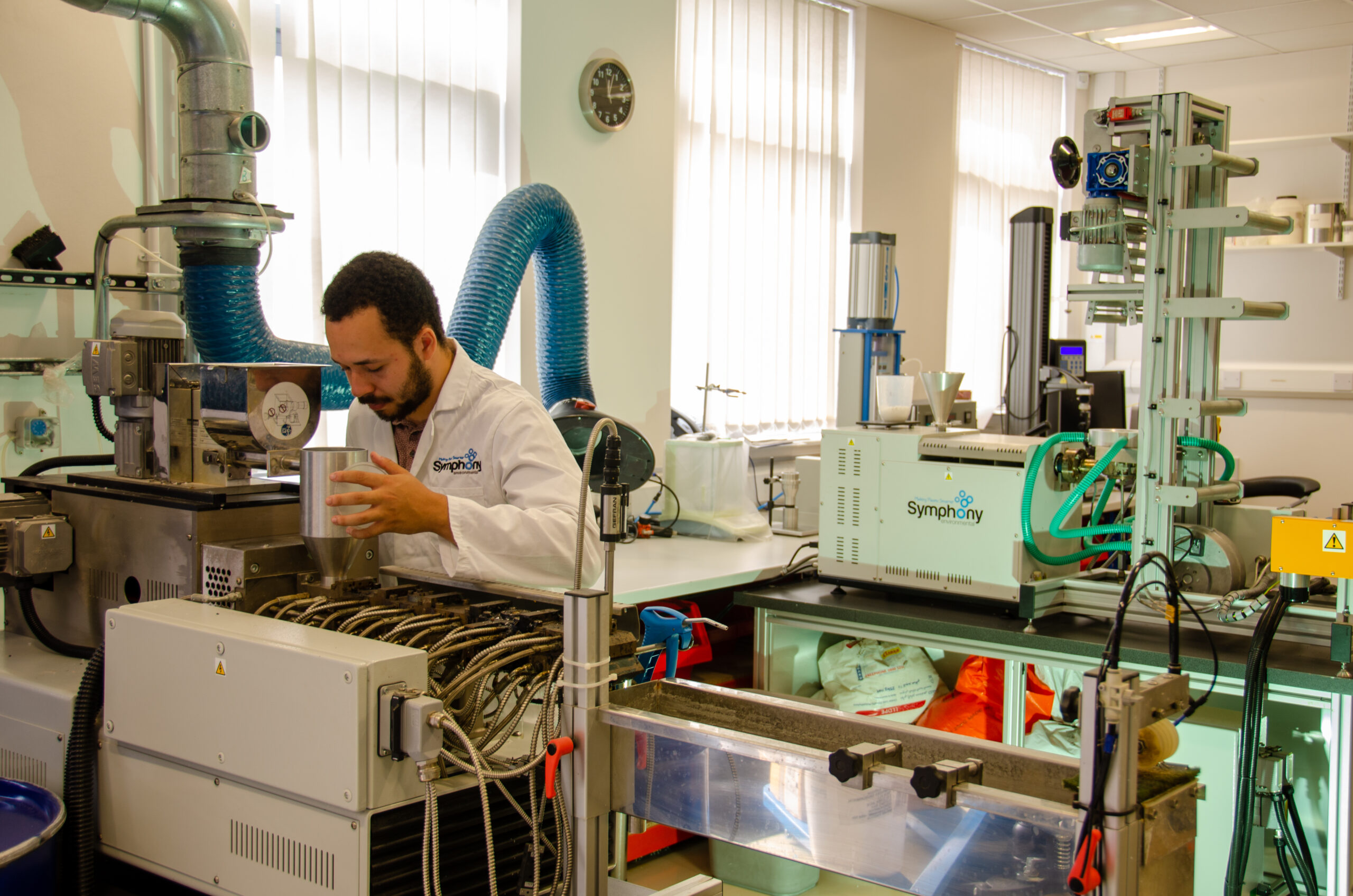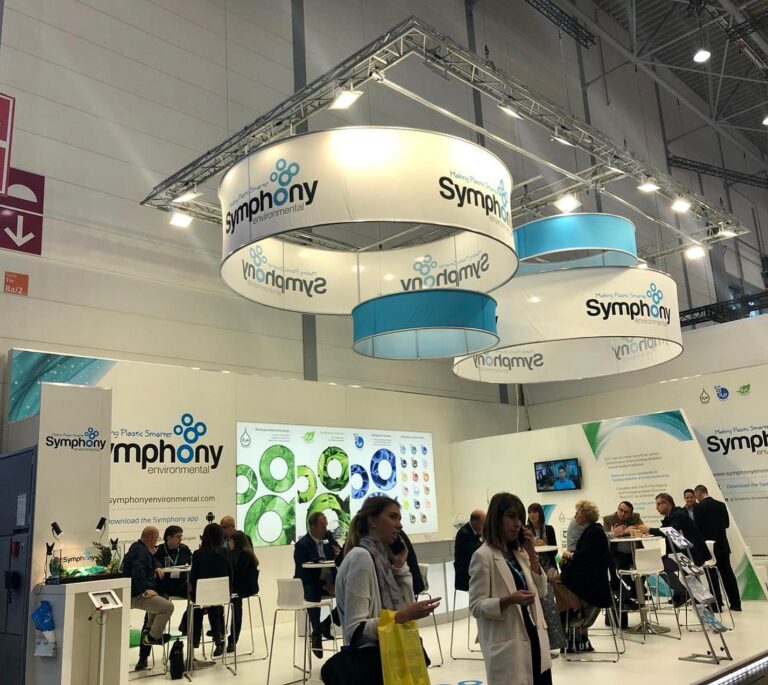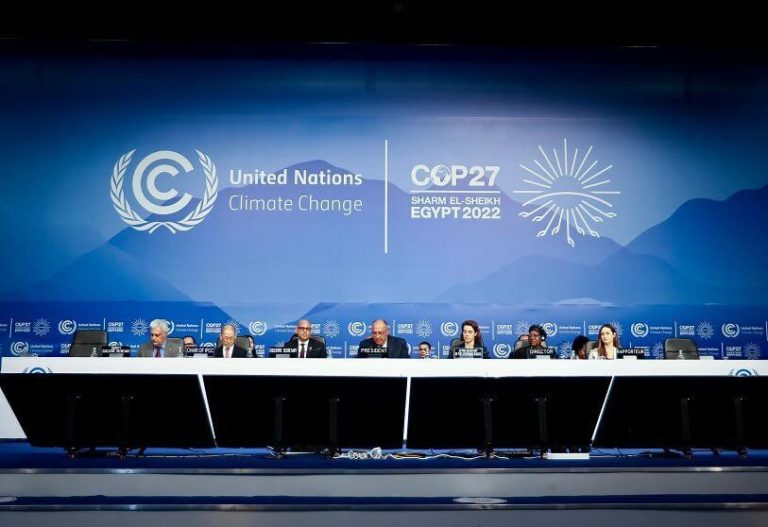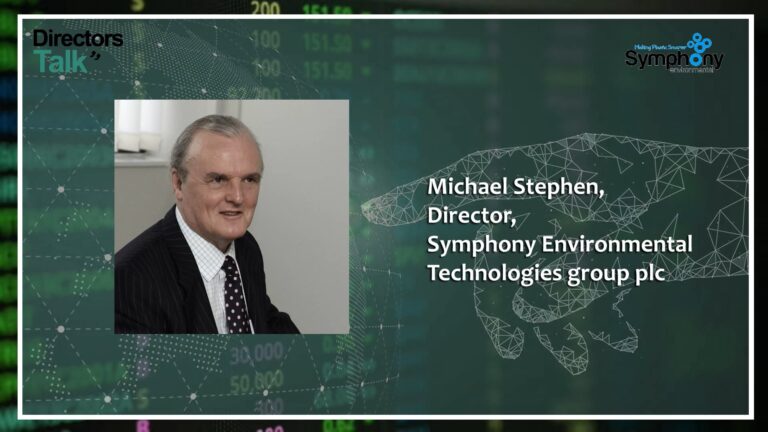Symphony Environmental Technologies plc (LON:SYM) Chief Financial Officer Ian Bristow caught up with DirectorsTalk to discuss its financial results, d2p & d2w operations, post period activity and what investors should be looking out for.
Q1: Ian, results for the six month period for Symphony Environmental. Can you just talk us through the financial highlights?
A1: Well, financially, revenues for the period to the 30th of June was £3 million, softer than previous periods due to a couple of areas, primarily our glove strategy has changed. We were selling lower value commodity gloves before, these are safety gloves and we’re now looking for EU certification on those gloves for various aspects, and that’s going to take a bit longer to get. As such, our gloves were £0 for the period, and we hope to start selling those later on this year and into next year.
There’s also some regulatory and resource issues in a number of our markets which has been overcome, and there’s also been some logistical issues. Freight rates have been very high since COVID and certain logistics, freight container timings have been quite difficult to deal with. That’s also softening up now, and we’re seeing in the second half of the year much more logistics much easier, and also the costing and the pricing coming down. That’s also in terms of more materials as well so if we look at our gross profit margin which fell slightly during the period, again, there was high raw material costs, and we’re seeing those coming down second half of the year.
So, the second half on reflection, those numbers actually is going to be much, much better.
In terms of our expenses, we continue with the same overhead base as in the previous periods, and within that, there’s a lot of investment in personnel, supply chain sales, R&D technical and you can see the benefit of that in terms of the pipeline and the opportunities that we’re developing. Also, with our external consultancy advocacy costs, and again, the benefit of that we can see with the legislative frameworks that’s being developed in Latin America, Middle East etc. which is now moving in our direction.
So, it just resulted in a loss of about just £1.4 million and that’s really the first half summary for you there.
Q2: What’s happened operationally across d2p and d2w?
A2: Quite a lot. The main agreement is with Bimbo, Bimbo is the western world’s largest bakery and we’ve got an agreement to supply them with our d2p antimicrobial bread technology. This technology has got FDA and Health Canada approval. Where we are at the moment, we’re just going through various tests and trials in a number of locations with them, and it’s looking very favourable in terms of the commercial start of that, hopefully starting very, very soon. We’ve indicated that in our pipeline expectations as well, which I’ll come to a bit later. We are also active in all parts of the world with this technology as well so it’s not just with Bimbo in parts of America, it’s in other companies in India, in Africa, and those parts of the world.
In terms of what we call pipeline, this is our d2p anti-insect, flame retardant and antimicrobial, a number of successful trials within the pipeline. This pipeline has got over 60 customer-led projects, again, global, in India, Pakistan, Africa, Latin America, Europe, the whole of the Americas as well, it’s nicely spread. So, again, we’re seeing some great test results, great trial results so again, we’re very hopeful for near term conversion of those results. Again, it’s within our pipeline, this £14 million pipeline, that we’ll come to.
For d2w, there’ve been some contract winds in the US for d2w, there was cosmetic bottles, which is very, very exciting in the US so that’s not regulatory led, but in terms of regulatory, we’ve had the confirmation in Peru that the d2w is approved there, as an approved product within the framework there. We’re seeing positive movement in the rest of Latin America and also the Middle East with d2w in the biodegradable aspect, and again, we’re hoping for some more news if you like, in the second half of this year.
Q3: What can you tell us about activity post period end?
A3: Post period end, India is the prime market post period end, we released an Indian RNS at the same time as the interim statement.
So, India, they’re seeing a substantial growth in sales so the joint venture which is with Indorama Corporation started trading in February and they’re seeing, in recent weeks, peaks in revenue and they’re expecting revenue to reach £ 250,000 a month from January 2023. This is led by new rules and regulations that’s come into place which is banning effectively thin gauge products; films, packaging products, but you can be exempt from this if your product is biodegradable. Now, where Symphony is on this and where the customers in India see Symphony on this, as us being the answer to this because we have Indian accredited standards that fulfil biodegradability and also eco-toxicity as well, we’re biodegrade safe and sustainable for the soil. So, the customers are placing orders with India.
What we’re waiting for is actual certification so we’re expecting to get a specific certification for our d2w products in India, which will then pull the whole thing together. Customers are buying at the moment regardless, because they have to, they have no choice, if they don’t show biodegradability in their products then, they’ve got to make thicker films, if you like, and that will add two to three times to their costings. So, that’s very exciting.
In addition, post period end, our insecticidal business, primarily with Rivulis but we are in negotiations with other companies globally so they places some sizeable orders for delivery, and they’ve been dispatched now. With Rivulis, we’re expecting that to grow into other regions where Rivulis trade, and as I said, there’s other players as well in that market so very, very exciting.
Again, with the d2w, following on from the Latin American advocacy, that Peru win for d2w, Mexico themselves has developed a standard. The standards are very, very important because they give legislators a framework and this standard is advantageous to d2w.
Really, the final part of our outlook, our post period end, is our near term pipeline. So, we expect a running rate to be achieved between now and sometime during the first half of next year of about £14 million of annual sales. This is a near term expectation, and that expectation we’ve broken down into:
Growth in d2w so if you look at last year’s revenues of £7.2 million, we expect that to grow to £9 million. We feel that’s quite modest, easily achievable with the legislative frameworks in place,
With our bread technology, again with the western world’s largest producer, we’re looking that being around £2.5 million per annum.
The insecticidal, we should get to £1 million per annum, and
General pipeline, which is the conversion of these 60 or so projects, we should at least get to £1 million pound as a running annual rate for the business.
I actually missed Middle East in all of this, there’s been so much going on here. In the Middle East, our partners have started manufacturing there and that’s coinciding with what we can see as better enforcement because within the Middle East, it’s Saudi Arabia and UAE, they actually have legislation in place, which is favourable to our d2w products.
So, all of those things together, we’ve got very, very, exciting near term opportunity and then the longer term opportunity is a multiple of that, we feel.
Q4: With all these projects going on and everything that you just told me about post period, it must give you confidence looking forward?
A4: Exactly.
Q5: With that in mind, what should investors be looking out for next from Symphony Environmental?
A5: It’s very difficult predict timing of things, but I think with India, with the bread, Middle East in particular, there will be over the near term, positive events that we see, and also, with our general pipeline as well. Again, because that’s in a number of areas and I’ll say 60 items in the pipeline but some of those are quite large and some of those are bimbo-esque, if you like, in their potential or Rivulis-esque in their potential as well.
So, I think all across the board really, any of these areas in the pipeline that we’ve indicated near term, is something that investors could see updates to between now and next year.










































